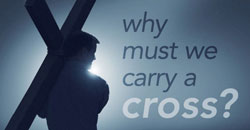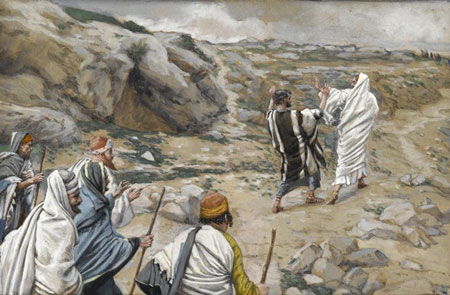1. Lawrence – from "Disclosing New Worlds" – "A New Call"

Now Jesus is changing direction and focus. He is beginning a new journey whose destination is Jerusalem. The journey towards Jerusalem is the narrative symbol for the new emphasis – the Way of the Cross.
This narrative journey will disclose increasingly who Jesus is (the one who must suffer) and intensifying conflict and direct confrontation with the powers ranged against him. Yet the focus is on the disciples. How will they react to “The Way”? Will they understand? Will they “see” and “hear” what Jesus is telling them? Most importantly, will they follow, or will the Way of the Cross prove (literally) a step too far?
There is a clear narrative pattern to “the way”. It occurs again in 9:31 and 10: 32-34, and in each case – as here – the pattern is repeated: Jesus tells the disciples that “the way” is the way of suffering and death; the disciples resist this; Jesus then teaches them further about discipleship and what it means to follow him.
That is why the change of direction results immediately in Jesus’ question: “Who do you say that I am?” This is not only the midpoint of the story, but also the narrative fulcrum around which the whole gospel pivots. Who do you believe Jesus is? Which Jesus will you follow – the Jesus who travels the Way of the Cross, or the glorious, triumphant Jesus whom the disciples desperately want him to be? Or will it be a Jesus of your own making?
Jesus goes on to spell out what the Way of the Cross means for any would-be followers. It requires three things: denying self, taking up the cross, and following. There is no other way. If the Lenten journey means anything, it means discovering what this entails – just as it did for the disciples. It is not about giving up something that we like, or coping with a difficult situation at work, home or at church. That is to spiritualise and trivialise Jesus’s address and Kings’ call. The gospel was written for a community that understood at first hand what persecution meant. It meant being hauled up before the courts and, like Peter, being asked, under threat of death, “Aren’t you one of his disciples?” The temptation is to deny Jesus in order to save our own lives. Jesus tells the disciples, “If you confess me, you deny yourself – because you will be put to death for it! And yet that is actually the way to find (save) your life!”
To “take up the cross” means literally that! The journey Jesus has just begun is the journey of political confrontation. Ched Meyers suggests that the phrase “Take up your cross!” was in all likelihood a recruitment slogan for revolutionary groups – effectively “suicide squads” who were being asked to risk almost certain capture and crucifixion. There is nothing spiritualised or trivialised about Jesus’ call to discipleship here. The message of the Kingdom that he proclaims is necessarily the Way of the Cross because it is the promise and announcement and enactment of a new world order – God’s.
Note that this is a new call. In 1:16ff Jesus calls the first disciples, saying simply, “Follow me, and I will make you fish for people”. In other words, there are people who want to hear Jesus’ message, and he invites them to follow and be part of spreading Good News that is eagerly received. Now the direction changes. This is a new journey – a journey of confrontation. It bears a deadly cost. And as Jesus enters this new phase of his ministry, he does not say, “Follow me”, but warns the disciples about what is entailed and gives them the opportunity to back out. Lent is about facing the seriousness of discipleship, and wrestling seriously with the question about whether or not we are “up for it”



